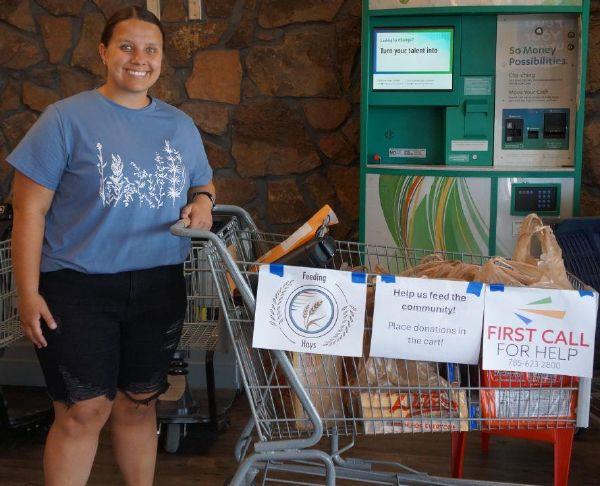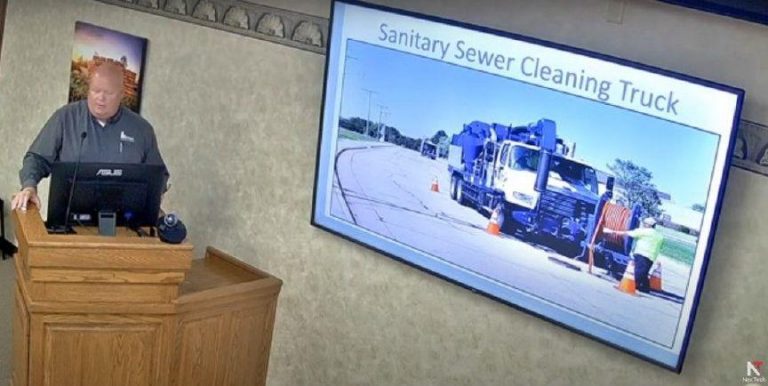TMP looks for new activities director
A year after taking the position, James Harris is stepping down as activities director at Thomas More Prep-Marian. Harris cited health and family considerations.
A year after taking the position, James Harris is stepping down as activities director at Thomas More Prep-Marian. Harris cited health and family considerations.
A 50-state assessment showed the percentage of Kansas children living in poverty declined and the portion of teens not in school or working increased, while there were increases in fourth graders struggling with reading and eighth graders flustered by math.

A 77-year summer tradition at Fort Hays State will be underway with High Plains Music Camp, slated to begin the last week of June. For the last 20 years, the camp has been held in July. However, the dates have been moved forward for 2024.

Representatives of the Kansas City Chiefs and Royals urged Kansas lawmakers Monday to expand a tax incentive program to provide the teams millions of dollars to leave Missouri and set up shop in new stadiums across the state line.
Before the Hays City Commission unanimously approved purchasing four replacement pickups at a cost of $277,740 from Lewis Ford of Hays (two for the Water Resources Department and two for Public Works), Water Resource Director Jeff Crispin presented purchase price data for the City from 2010 through 2022 as well as pickup prices information from Lewis Ford from 2021-2024.

Now that school is out for the summer, 4-H families oftentimes are busy getting their fair projects ready for exhibition. In the case of beef projects, the experts at the Kansas State University Beef Cattle Institute offer some guidance on how 4-Hers can have positive learning experiences with their animals. On a recent Cattle Chat podcast, K-State beef cattle nutritionist Phillip Lancaster said It begins with making a feeding plan. “One of the most common mistakes is that people either underfeed or overfeed their market animals,” Lancaster said. He gave the example of an 800-pound market calf that the 4-Her takes possession of after weaning should consume about 25 pounds of total feed per day, and 20 of those pounds should be provided as grain. “It is especially important to feed them properly in the last 60 days before the fair to get the appropriate finish (body condition) on the calf,” Lancaster said. “To do that, it is important to weigh the feed to make sure they are getting the right amount.” Along with feeding them adequately, K-State veterinarian Brian Lubbers said it is important to keep feed and health records. “To help 4-Hers calculate the calf’s average daily gain and cost of gain, it is good to have a beginning weight, mid-weight and final weight before leaving for the fair,” Lubbers said. “All health treatments need to be documented as well.” Planning for the fair also involves training the cattle to respond to the 4-Her leading them with a halter, and placing their feet in the proper stance with a show stick. “It is important for 4-Hers to halter-break the calves early before the cattle are big and harder to handle,” K-State veterinarian Bob Larson said. “To do that, families should follow low-stress handling techniques and give 4-Hers plenty of time to work with their calves before going to the fair.” It also helps to expose the animals to different handlers and noise situations because the county fair can offer an array of new sights, sounds and smells, said the experts. To hear the full discussion, listen to the Cattle Chat podcast on your preferred streaming platform.
A 2023 annual report by the March of Dimes on maternal health care in Kansas has highlighted a need for the state to address a potential crisis for birthing-age mothers and their babies. The 2023 March of Dimes Report Card found that 45.7% of Kansas counties are defined as maternity care deserts – indicating a lack of obstetric providers, and lack of hospitals and birth centers with obstetric care. Last year, the report notes, 8.4% of birthing-age women -- 1 in 12 -- had no birthing hospital within 30 minutes. “There are certain barriers that Kansas women of reproductive age have to deal with,” said Elaine Johannes, the Kansas Health Foundation’s Distinguished Professor of Community Health at Kansas State University. “The number one barrier is distance, and that’s where the ‘desert’ idea comes from, but they also have to overcome barriers due to lack of health insurance and lack of providers.” The March of Dimes reports that women in Kansas, overall, have a high vulnerability to adverse outcomes due to the availability of – or lack thereof – reproductive health services, including care for the mother before, during and after their child’s birth. Statistics indicate that, among birthing mothers in Kansas, there were 22.0 deaths per 100,000 births in 2023, either during the pregnancy or within six weeks after the pregnancy ended. The infant mortality rate in Kansas in 2023 was reported at 5.3 deaths per 1,000. The rates among black birthing mothers and their babies were much higher. In 2023, the Kansas Department of Health and the Environment Bureau of Family Health was awarded $1.1 million from the U.S. Health Resources and Services Administration to launch the State Maternal Health Innovation, MHI, program in Kansas. The goal: Implement maternal health services across Kansas, such as improving access to services during pregnancy and the postpartum period, or equipping the maternal and child health workforce with training and resources. “I think most of us understand that being a healthcare provider is a challenging career,” Johannes said. “It’s very rewarding, but it is challenging. And there are projections currently that look at where maternity care deserts will be – and there will be some hotspots around the state – but primarily those are in our rural areas.” Johannes serves on a committee formed by MHI, which is administered by Wichita State University’s Community Engagement Institute. The group’s first meeting was held in late May; over time, the group will conduct baseline assessments of the state’s maternal care, identify gaps, write a strategic plan and help staff carry out new interventions. “Kansas is not alone,” Johannes said. “There is a concern about access to maternal care in many rural and frontier states, as well as the cost of that care. Rural states, and many Midwest states, have a challenge to recruit and keep healthcare providers.” She adds that maternal care “is not just a women’s issue.” “It affects the men that are part of our families and our communities, too. I remember one of our extension directors told me that if there’s a death in a small town, it affects the whole community. There’s a ripple effect. And so I think we can all contribute toward being watchful and helpful with pregnant moms and their families, looking at our access points and helping with providers and policy changes.” Johannes said the U.S. Centers for Disease Control and Preventation is another good resource for women. The CDC supports a campaign called HEAR HER, which can help pregnant and postpartum women and their families recognize signs and symptoms of maternal distress. A longer discussion with Johannes on her work with the Maternal Health Innovation program is available on the online program, Sound Living, produced by K-State Research and Extension.

The Hays City Commission voted unanimously on June 13, 2024 to award two contracts to the lowest bidders for annual water system programs. CC Steel, LLC of Fargo, ND received the 2024 Sanitary Cleaning and Inspection contract ($133,462.08, not to exceed $150,000) and Mayer Specialty Services of Goddard, KS received the 2024 Manhole Rehabilitation Contract (not to exceed the budget of $150,000.)
Before Outside Agencies made their formal 2025 Budget funding requests at the June 11, 2024 Ellis County Commission Meeting, Chair Nathan Leiker, Commissioner Neil Younger and County Administrator Darin Myers described the new budget process approved by consensus earlier this month. Going forward, seven organizations going forward will present their requests directly to Commission while all others will submit their requests to the Care Council of Ellis County through the United Way.